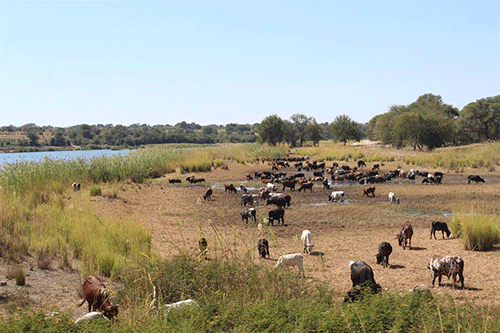Namibia has suspended the export of live cattle to South Africa, following the outbreak of Foot and Mouth Disease in that country and the subsequent measures equally imposed by South Africa to prevent the spread of the disease.
A media release by the Ministry of Agriculture, Water and Land Reform’s chief veterinary officer Albertina Shilingo on Friday said Namibia has similarly imposed a movement restriction of live cattle to control FMD outbreaks.
This movement restriction implies there will be no export of live cattle from Namibia into South Africa until further notice.
The ministry’s Directorate of Veterinary Services has, therefore, suspended with immediate effect the issuance of export health certificates and certification of veterinary import permits for live cattle destined for South Africa.
The ministry has also placed conditions on the importation of livestock feed from South Africa, which entails the importation of grass, straw, forage, lucerne and silage is possible only if it comes from commercial feed establishments registered with the veterinary authority of South Africa with strict FMD biosecurity measures.
Also, no cloven-hoofed animals should be kept in establishments from which the
feed has been harvested. The feed is free of grossly identified contamination with the material of animal origin, and baled livestock feed should be subjected to the action of steam in a closed chamber such that the centre of the bales has reached a minimum temperature of 80°C for 10 minutes.
Alternatively, the action of formalin fumes (formaldehyde gas) produced from its solution at 35-40% in a chamber kept closed for at least eight hours at a temperature of 19°C, or the livestock feed should be kept in bond for at least four months prior to export.
Pelleted livestock feed should be subjected to a minimum temperature of 70°C for a minimum period of five minutes during production – and grass, straw, hay, forage, lucerne and silage should comply with all these conditions if they are to be used as premixes/raw materials in the production of fully processed feed.
Restrictions have also been placed on the transportation of such livestock feed in that it should be transported in vehicles that are cleaned and disinfected under the supervision of the South African Veterinary authority, which approves the disinfectants that are effective to inactivate the FMD Virus.
Moreover, disinfected vehicles should be issued with a cleaning and disinfection certificate that is valid for one consignment only and must be presented to Namibia’s veterinary border officials.
“Vehicles should be loaded and sealed under the supervision of the South
African Veterinary authority and seal numbers endorsed on the veterinary
import permit. The vehicles should be sealed in such a way that no unauthorised materials can be added to the consignment after it has been sealed,” the media statement reads.
The move is expected to severely impact farmers, most of whom are reliant on the export of cattle weaners to South Africa for survival.
The suspension also means no local auctions or permit days will be held for the buying and selling of livestock in many parts of the country, pending the lifting of such suspension.


